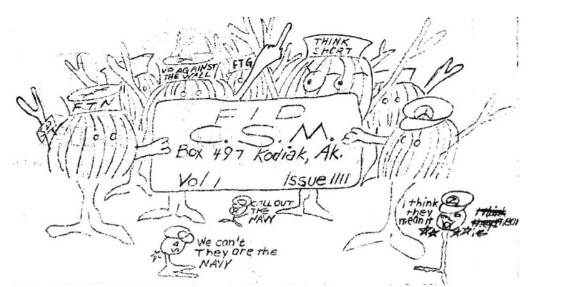The University of Alaska Southeast and Veterans For Peace chapter 100 will host the Waging Peace in Vietnam exhibit Nov. 11-Dec. 15, 2022. As a graduate of the Naval Academy at Annapolis, ex-Navy fighter pilot and Vietnam Veteran, I will be part of the Roundtable Discussion at 1 p.m. on Saturday, Nov. 12, in the Egan Wing of the UAS library. This will offer an opportunity to revisit Alaska’s Vietnam-era GI antiwar activity, which was quite extensive, as it was at almost every American military base in the U.S. and worldwide. Did you know that there were at least four underground antiwar newspapers published by GIs at U.S. military bases in Alaska? There was also a Native American paper by soldiers at Fort Lewis in Tacoma, Washington. While a bit south of Alaska, it spoke for all Indigenous GIs, many of whom came from Alaska.
FID
FID, the most influential underground GI newspaper in Alaska, was published by Navy and Coast Guard personnel in Kodiak in 1971. A Fid is a traditional sailor’s tool that is still used with knots and ropes. It was the newsletter of the Concerned Servicemen’s Movement (CSM), a group of Coast Guard and Navy sailors who opposed the war and argued for improved GI rights. CSM members also played a role in the founding of Greenpeace, the influential environmental organization. A borrowed fishing boat named the Greenpeace was on its way to protest a powerful U.S. nuclear underground test on the island of Amchitka. The U.S. Coast Guard Cutter Confidence was sent to confront the Greenpeace at sea. Eighteen Coast Guard crewmen, including several CSM members, penned and then smuggled a letter of support for the Greenpeace voyage. This action helped influence members of the Greenpeace crew to found the organization we know today.
Anchorage Troop
The Anchorage Troop was created in 1970 at Fort Richardson in Anchorage. It argued, among other things, that the U.S. military was “organizationally insane.” One of their leaders was Private Joseph Miles, a Black GI who had become a celebrity among rebellious GIs for helping to create chapters of antiwar groups and underground newspapers at three different military bases. He started by playing Malcolm X tapes in the barracks and soon formed a peace group of Black and Puerto Rican soldiers. The Army attempted to disrupt the group by shipping Miles to another base where he quickly started a second organization and newspaper. Furious, the Army transferred him to Fort Richardson, where to the Army’s dismay, he soon created another group and paper.
Green Machine and The Arctic Arsenal
The Green Machine was distributed at Forts Wainwright and Greely, and Eielson Air Force Base in Fairbanks in 1970. It promoted ending the Vietnam War, regaining Constitutional rights for GIs and ending racism.
The Arctic Arsenal appeared at Fort Greely 1971. The newspaper declared it would “be a weapon to use against an Army which distorts the lives of us all, if it doesn’t get us killed.” It called for an immediate end to the war, the abolition of the draft, and democratic rights for GIs.
Yah-Hoh
Yah-Hoh was a paper by and for Native American servicemen and women. The name Yah-Hoh means “Lets Get It Together”. The group called themselves Hew-Kecaw-Na-Yo (To Resist). It was created by GIs at Fort Lewis whose logo was the letters FTA (F*** The Army) with an arrow through it. The first issue stated: “This newspaper is published by Hew-Kecaw-Na-Yo, an organization of American Indian servicemen and women that are preventing the psychological conditioning of Indian minds. It was formed for the purpose of helping a struggling people to retain their identity even in the white supremists’ most powerful organization, the U.S. armed forces. Hew-Kecaw-Na-Yo is dedicated to Indian unity; united we stand, divided we fall.”
On Veterans Day, let’s thank GIs in Alaska for their dissent. They helped to end the war and bring our boys home.
For more on the GI Underground Press and the exhibit visit www.WagingPeaceInVietnam.com To attend the exhibit and related events, including the roundtable, visit the UAS website
• John Kent is a graduate of the Naval Academy, ex-Navy fighter pilot and Vietnam veteran. Columns, My Turns and Letters to the Editor represent the view of the author, not the view of the Juneau Empire. Have something to say? Here’s how to submit a My Turn or letter.

